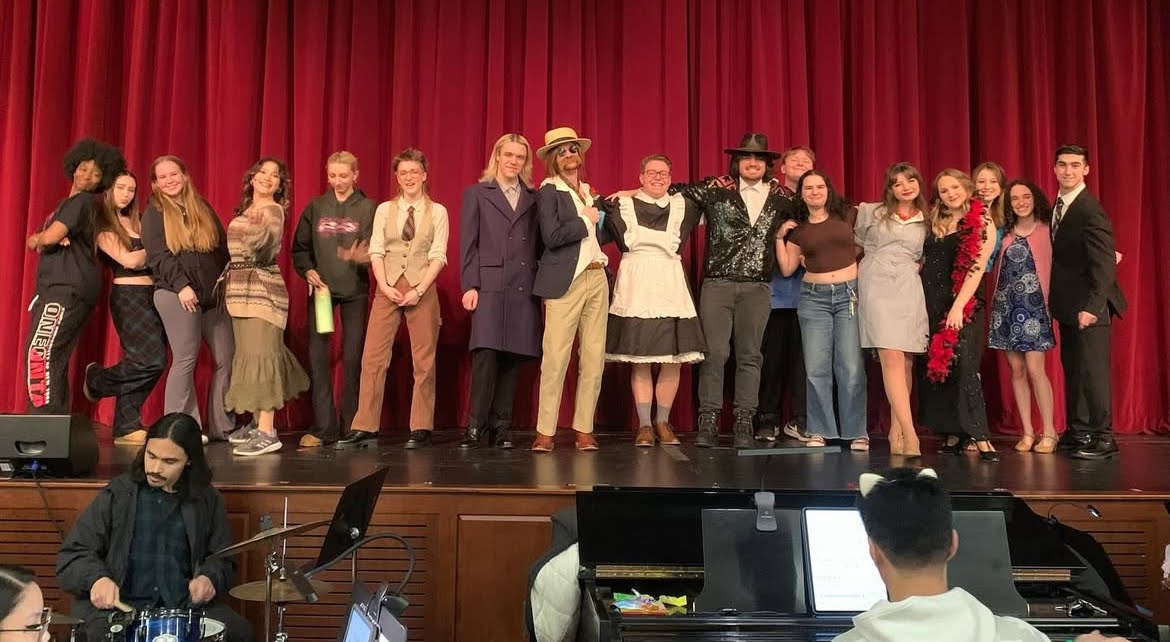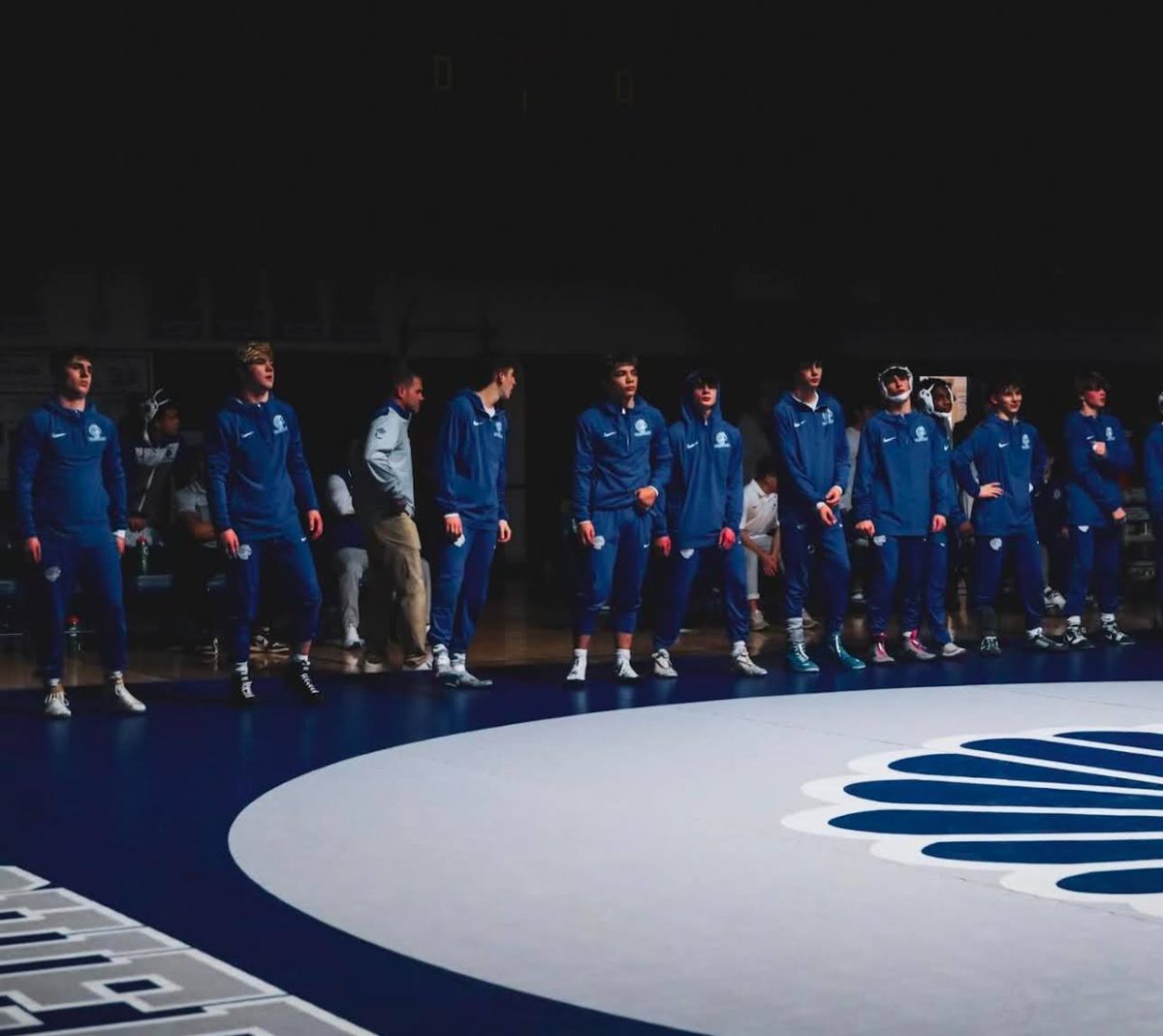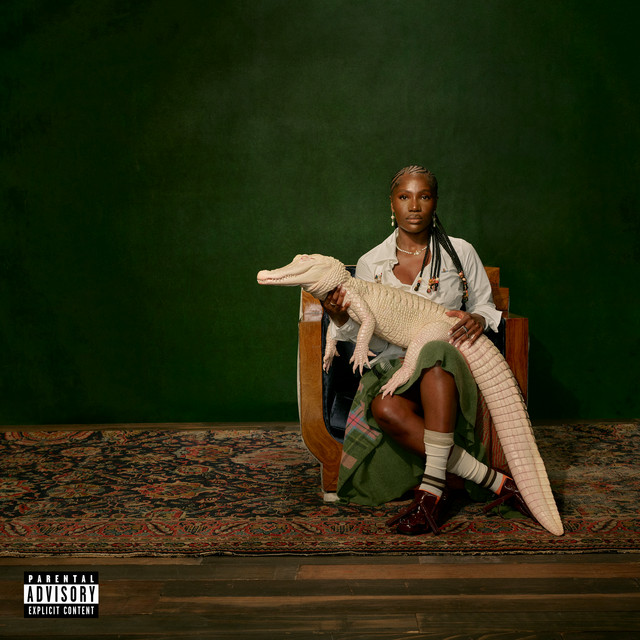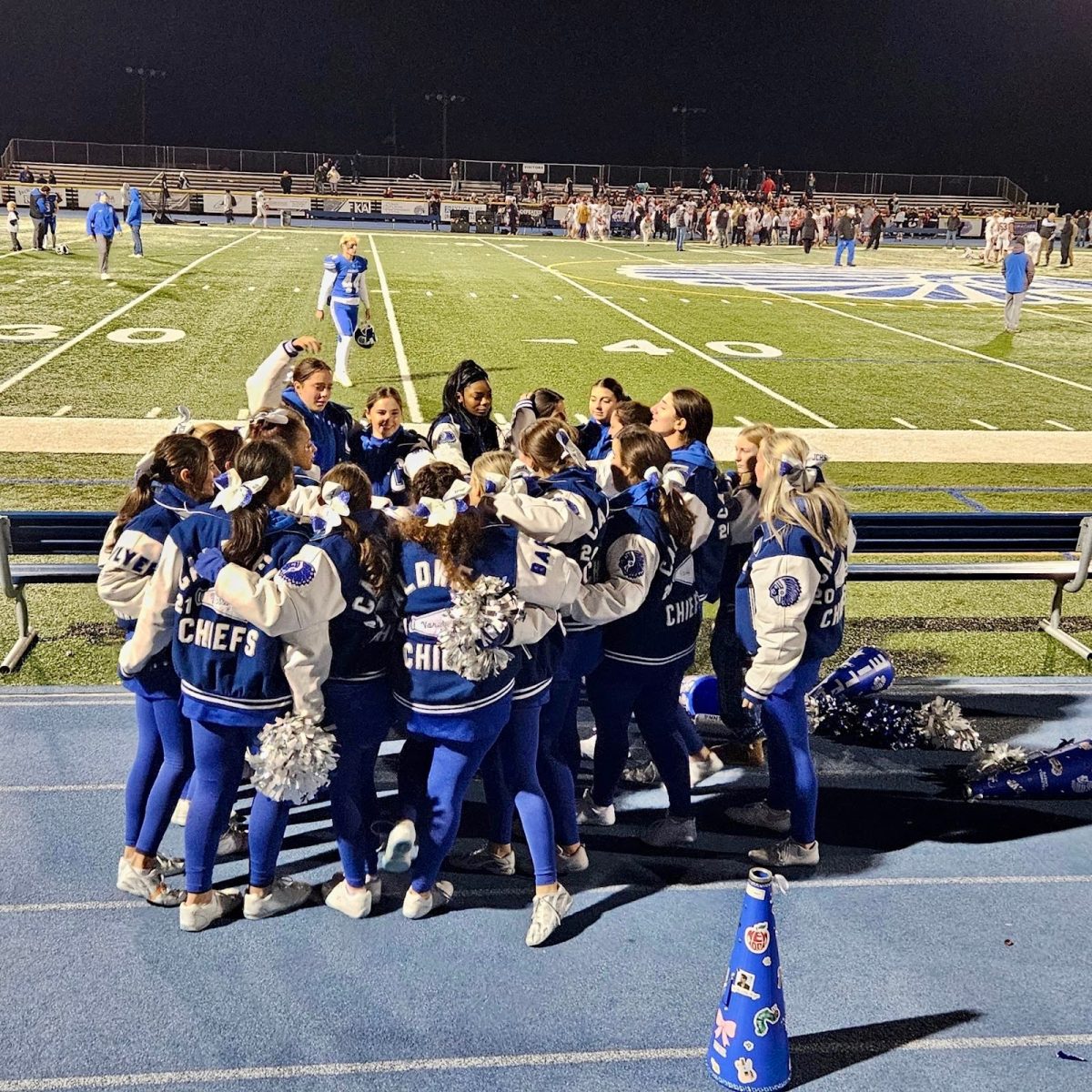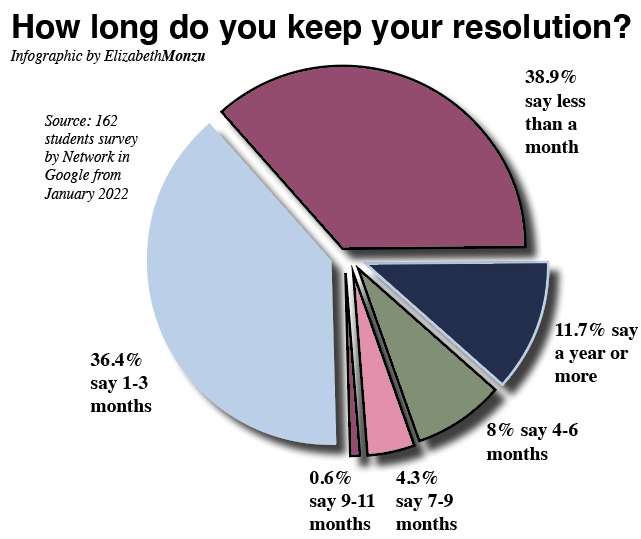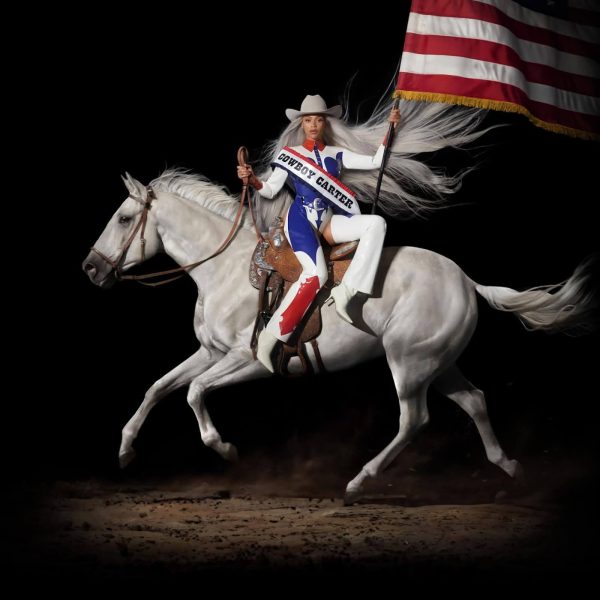
Intro:
“Do you hear me?” Beyoncé questions in the opening song, “AMERIICAN REQUIEM”, of her 8th studio album, Cowboy Carter. She says this in contemplation of whether people are actually listening to her work, instead of regurgitating criticisms. She sings, “It’s a lot of talkin’ goin’ on / While I sing my song” to back this idea up. Many people overlook Beyoncé’s ability to change her sound. “Can you hear me? / Or do you fear me?” she states in the song. It is clear that Beyoncé feels like no one is truly listening to her work, and only putting her in boxes of what they see her as.
In a way, Beyoncé has been reduced to her genre as an artist, without people understanding her roots or where she came from. These are sentiments people have been maintaining since this February, when she won Album of the Year at the 67th annual Grammy Awards. The media erupted into chaos immediately following the ceremony, stating that she didn’t deserve the award and horrible and frankly racist things. So, in this article, Milianna and I will dive into the album’s complexity and explain why it is deserving of Album of the Year, and yes, Country Album of the Year as well.
Last November, I wrote an article about the Grammy nominations and my predictions, accompanied by who I thought deserved to win. I wrote that, “this album redefined country music as a whole and reclaimed the sound for others to take inspiration from” (Levine). I still agree with this, and I hope that you will as well after reading this article.
What is a Genre, and What Makes a Song “Country”?
Genres, as defined by West Music, are categories of music that “describe the music’s form, style, and cultural influence.” A genre is broad, so there are fusions and different styles that can still exist under one genre’s umbrella. Country music, specifically, is defined as “a style and genre of largely string-accompanied American popular music having roots in the folk music of the Southeast and cowboy music of the West, usually vocalized, generally simple in form and harmony, and typified by romantic or melancholy ballads accompanied by acoustic or electric guitar, banjo, violin, and harmonica” (Dictionary.com).
Beyoncé didn’t create Cowboy Carter to simply swap genres and let the shock carry promotion. Beyonce made Cowboy Carter to thank “all of the pioneers who originate culture” (Beyonce, Rolling Stone) as per the reclamation theme of her three-part album trilogy.
But what is Beyoncé “reclaiming,” and for whom? The concept of Cowboy Carter transcends a regular studio album– over 70 writers had collaborated to bring Beyoncé’s vision to life: reclaim the genre of country music for Black Americans in style. Truthfully, the genre began in rural Southern America in the early 1900s, yet unbeknownst to many, that melancholic and romantic melody atop instrumentals of banjos and harmonicas came straight from slaves. Country music was “often rebranded or stolen from the hymns and field songs of Southern enslaved people” (Crimson), which directly relates to the typical blues roots in the genre, another style of music that black Americans had originated. The melancholic sounds of jazz, blues, and country genres all reflect the great depth of human tragedy in the South and the intense injustices slaves had to face. In their music, slaves wanted to share their own painful stories, which is reflective of the typical nature of lyricism in country songs today–storytelling.
Today’s country music does not see many mainstream black artists despite the genre’s black origin. Beyonce’s “reclamation” of the genre is to bring to light the genre’s roots and prove that black artists can be country, too.
Any musician can surely find passion in a genre and pursue its history, but Beyoncé is definitely over-qualified for the job, and her qualifications actually lie in her own blood. Born in Houston, Texas, as she so proudly shares in her lyrics across multiple songs since her early career, she is a product from the heart of country music: the American South. Her mother, Tina Knowles, is a Louisiana-Creole, meaning Beyoncé has French and African blood. Her father, Mathew Knowles, is African American and originates from Alabama. Beyonce’s admiration for country music wasn’t spontaneous or sudden– she grew up in and all around it. If anything, Cowboy Carter was a long time coming.
The Inspiration for Cowboy Carter:
In order to understand why Beyoncé came up with the idea of Cowboy Carter, we must look into the past to see what inspired her. It is believed that one specific instance kickstarted the writing process. In 2016, Beyoncé released her critically acclaimed, and perhaps her most controversial album, entitled Lemonade. This album had themes of love, adultery, reclamation of identity, and spanned across genres such as r&b, rap, pop, and even…country?
Many people had these sentiments believing that Beyoncé “isn’t even what country represents” (New York Times), a widespread response to her song called “Daddy Lessons,” the sixth track on the album. This song had a very country-twangy sound that many found offensive. However, this song fits the definition of country music because of its storytelling lyrics and a banjo & acoustic guitar playing as its instrumental.
When it came time for award season, Beyoncé was invited to perform at the Country Music Awards, along with the country group, the Dixie Chicks. People were outraged to say the least. They viciously attacked the performers, stating that “neither are country, and Beyoncé could not be bothered to put some clothes on for the occasion” (New York Times). These opinions caused the video of the performance to be taken off of YouTube for the amount of hate it was receiving. This hate was inconceivable, because of the previous year’s pop crossover, with Justin Timberlake performing a mashup with country legend Chris Stapleton. As you can probably imagine, it only empowered someone as confident as Beyoncé more.
When it was time to start the production of Cowboy Carter, Beyoncé touched on these events in her song, “AMERIICAN REQUIEM,” alluded to earlier in the article. Beyoncé sings out that “They used to say I spoke too country/Then the rejection came and said I wasn’t country ‘nough” (Columbia Records). This only shows how Beyoncé turned the hate into motivation, and “saddled up” to the challenge, as she describes it in the following lines of the song.
Beyonce’s Ode To Dolly Parton, the Beatles, Chuck Berry, Willie Nelson, Linda Martell, and more:
Cowboy Carter is composed of 27 tracks, but upon reading the tracklist, many were excited to read the titles of a special three out of 27 of those tracks: “JOLENE”,“BLACKBIIRD,” and “OH LOUISIANA,” which are all covers of iconic country hits of similar titles. Opponents of Beyoncé’s genre swap assume that these three tracks were included to simply qualify the album as country, or that three covers existing in her album makes it completely “unoriginal.” But, Beyoncé’s renditions of these songs were included to pay homage to the country pillars, not to mention the aforementioned country legends were featured on other original tracks and interludes, such as “DOLLY P” featuring Dolly Parton, “SMOKE HOUR ★ WILLIE NELSON” featuring Willie Nelson, and “SMOKE HOUR II” featuring Willie Nelson as well. The covers, without erasing the country sound or straying from its stories, are renewed with the dramatic, versatile tone of Beyoncé, fitting into the album’s vibes cohesively.
“BLACKBIIRD”, originally titled “Blackbird”, was written by Paul McCartney, and was released under the Beatles in 1968. McCartney has explained that inspiration for the song came from his acknowledgement of civil rights and racial tensions in America. This is likely why Beyoncé included a cover of this song among a plethora of country hits– to shine a light on existing criticisms of America’s racism. McCartney wrote on Facebook in regard to Beyoncé’s cover that “she does a magnificent version of it and it reinforces the civil rights message that inspired me to write the song in the first place” (Facebook). Beyoncé’s willingness to sing such a politically and socially meaningful song written in the 1960’s proves that the issues that McCartney wished to address are still alive today.
Her cover of “OH LOUISIANA” contains a short verse written and sung by Chuck Berry, an original black country artist, giving his artistry a spot in the limelight while also referencing her mother’s roots in Louisiana. Beyoncé’s “JOLENE,” the original of the same title by Dolly Parton, gained a bit of controversy due to Beyoncé’s slight change in expression regarding this Jolene in question. Beyoncé sings, “I’m warnin’ you, don’t come for my man” instead of Dolly Parton’s “I’m beggin’ of you, please don’t take my man,” showcasing intimidation instead of Dolly’s desperation.
However, I think this slant in narrative makes sense for Beyoncé’s proud character and for the theme of Cowboy Carter. The album in itself is very bold, audacious, decisive, and persevering. It’s nothing less of a political and social commentary, but Beyoncé highlights strength in face of controversy, criticism, and oppression, not weakness. “I’m still a Creole banjee [girl] from Louisiana (don’t try me)” a line later in “JOLENE” furthers this idea of strength. Without taking too much away from Dolly Parton’s battle with a romantic rival, Beyoncé personalizes her own reaction. Dolly Parton even shares on the prerequisite track, “DOLLY P”: “You know that hussy with the good hair you sang about? / Reminded me of someone I knew back when” (Columbia Records) in reference to Beyoncé’s iconic “becky with the good hair” line in her 2016 album, Lemonade. Beyoncé’s homage to Chuck Berry, Dolly Parton, and Willie Nelson prove an authentic appreciation of the genre and her seniors. However, one country icon that Beyoncé references is particularly emphasized: Linda Martell.
“Genres are a funny little concept, aren’t they?” Linda Martell, the “black country music pioneer” as NBC titles her, says as an introduction to Cowboy Carter’s 12th track, “SPAGHETTII.” The misconception of the term “genre” is casually explained here– genres are meant to be broad or inclusive, but people love to use them as boxes, confinements: “In theory, they have a simple definition that’s easy to understand / But in practice, well, some may feel confined” (Columbia Records). The album itself is a testament to that. After its release, the public erupted into flames, claiming it to be too different, too much of a blend for the country genre.
That’s precisely why having Linda Martell announce that same message on both “SPAGHETTII” & “THE LINDA MARTELL SHOW” is so genius. Linda Martell is a black female country artist who is an unsung hero of the genre. She debuted in 1969, performing at the Grand Ole Opry, and in that same year, she peaked on the Billboard Hot Country Single Chart at #22 for her first song, Color Me Father. That peak would be a record for highest charting for a black female country artist until Beyoncé’s own “TEXAS HOLD ‘EM,” which topped the same chart at #1 at its release. Martell had faced prejudice all her career, but her music’s virality was inspiring for other artists like herself, as the first black female artist to have commercial success in the genre. Beyonce’s inclusion of Martell is a callback to who truly paved the way for black artists in country music.
For all the people who claim Cowboy Carter isn’t country enough, there’s Linda Martell to tell them that some tracks, like “YA YA,” “stretch…across a range of genres / And that’s what makes it a unique listening experience” (Columbia Records).
The breaking of the country mold is exactly why Cowboy Carter is so deserving of Best Country Album of The Year. Beyoncé acknowledges the cultural history of the genre, but also blends it beautifully with other genres such as rap, gospel, blues, and pop. She sings about the serious social failures and prejudices of America, but also about her pride and legacy as a Texan. It’s an authentic mix of both homage and modern innovation. The features on the album– ranging from Linda Martell to Miley Cyrus and Shaboozey, reflect that duality. Beyoncé is able to make a 27 track long album, give it both sentimental and hype energies, have it tell multiple stories, make references to the greatest contributors to the genre, have it feature upcoming black and female artists, and make statements about America, all successfully enough to earn the biggest award of the night on February 2nd.
Significance of the Album Cover:
Many people often overlook the power of album covers, as it is the first impression of a body of work. As Mercedes Holmes of Flocksy Magazine puts it, “A great album cover can be a visual “hook” that catches a viewer’s eye within seconds and makes a difference in whether your album is picked up and listened to.” (Flocksy). This is no different to Beyoncé, and the cover of Cowboy Carter. The cover of the album (seen in the beginning of the article) was shot by Blair Caldwell, an LA based photographer, who like Beyoncé, was born in Texas. This only furthers the idea of uplifting Black artists in country music.
That being said, the album cover is not as simplistic as you might think. It is actually very complex and has the same themes found throughout the music. The photo displays Beyoncé upon a white horse, adorned by a sash while she waves the American flag. The themes of American ideals are very present in the album cover, but what goes unnoticed is the breed of horse. The kind of horse that Beyoncé is on top of is known as the Lipizzaner horse. In adolescence, the Lipizzaner horse is born black, but eventually turns white as it reaches maturity. BBC describes this choice as a “meta-commentary, perhaps, on the gradual whitewashing of country music” (BBC). This clearly shows how Beyoncé planned out every step of her work, and did extensive research on the album. Also, Beyoncé nods to this horse on her penultimate track, “SWEET ★ HONEY ★ BUCKIIN’,” asking the listener to “look at that horse” multiple times throughout the song, essentially saying that the message cannot be ignored.
Conclusion:
As hopefully many of you see now, Cowboy Carter was not only an album, but a holistic artistic experience.. It ranged across many different genres, specifically country, paying respects to many country legends and uplifting new ones into the space. The cultural impact that this album had on the fans, the genre, and the world entirely was truly astronomical. It uplifted Black voices in a place where they had been suppressed for many years. It also reimagined popular songs in a new modern way, without losing the messages that they were created with. For all these reasons and many more, Cowboy Carter definitely deserved the win at the grammys, and also deserves your ears if you have not listened already.


